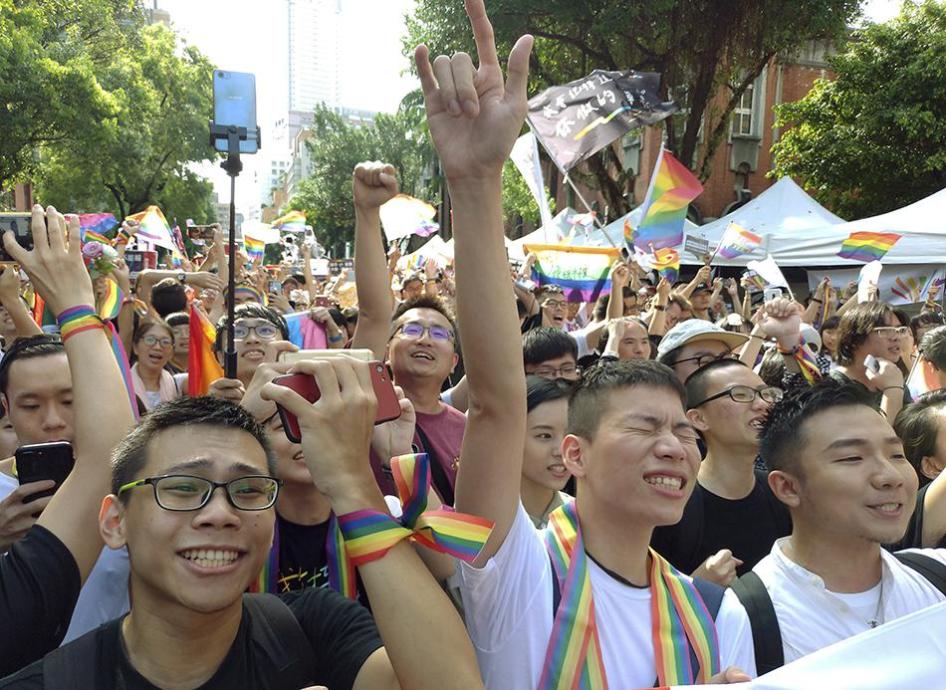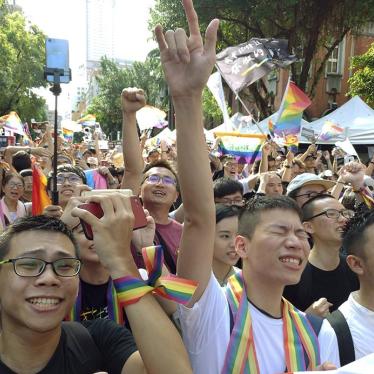Taiwanese gay rights activists have celebrated the island's historic move to legalize same-sex marriage with a mass wedding banquet for twenty couples and more than 1,000 guests, with hundreds more well-wishers picnicking outside the venue to show their support.
Saturday's feast came after the Taiwanese parliament enacted a bill to recognize the rights of same-sex couples, making Taiwan the first jurisdiction in Asia to do so and the twenty-sixth in the world. #LoveWon has trended on Twitter, not least because President Tsai Ing-wen tweeted it as the votes came in to approve the bill her cabinet had drafted.
The Taiwan vote on May 16 should not be understood narrowly as only a victory for same-sex couples who wish to wed—it is a precedent for Asia set by a democratically-elected government, which emphasizes the importance of protecting an often-beleaguered minority from persecution and discrimination.
The legislation comes as other places in Asia have been making similar strides in recent years, together generating a wave of progress for the rights of lesbian, gay, bisexual, and transgender, or LGBT, people.
In terms of marriage rights, attention may now turn to Japan or Thailand as perhaps the next territories to recognize same-sex relationships, because in both states, there is already significant momentum.
Twenty municipal governments across Japan recognize same-sex relationships by handing out symbolic though unofficial "partnership certificates," and a high-profile lawsuit filed earlier this year will challenge the lack of relationship rights at the national level. Chambers of commerce from the U.S., U.K., Canada, Ireland, Australia and New Zealand in Tokyo urged the national government to act earlier this year.
In Thailand, the cabinet supported a relationship recognition bill and sent it to the National Legislative Assembly for consideration. While the law may not pass during the current government's term which ends soon following recent elections, there's a good chance the next government will consider a similar bill.
Meanwhile, in Hong Kong, a 2018 high court judgment granted same-sex spousal visa rights (for expatriate dependents whose same-sex relationships are legally recognized abroad), and lawsuits brought this year presage an upcoming debate about comprehensive reform.
And don't discount Nepal—the Supreme Court ordered the government to study a pathway toward same-sex relationship recognition in 2007 and the resulting 2015 report recommended government action.
The legal change in Taipei is particularly important because it exemplifies how a government can stand up for minority rights in the face of negative public opinion. It is a lesson for other countries, and not just in Asia.
In 2017, the Constitutional Court found Taiwan's existing marriage act violated the Constitution on discrimination grounds by excluding same-sex couples. The court gave Parliament two years to rectify this, but public opposition led to a referendum in 2018 to gauge public opinion on same-sex marriage.
The results of the referendum were clear—the majority rejected marriage equality. In a last-ditch attempt to prevent equality, lawmakers proposed two alternative bills in parliament that offered a separate, and unequal, form of partnership recognition that fell far short of marriage. But Taiwan's lawmakers rejected these initiatives and voted in favor of the bill first proposed by the cabinet that provides a path to marriage for same-sex couples.
Elsewhere in the region, courts have shown a promising turn toward recognizing and protecting sexual and gender minorities, even in the face of hostile public opinion.
The 2018 decision by India's Supreme Court that criminalizing consensual same-sex conduct is unconstitutional was a major victory for LGBT people's rights to privacy and non-discrimination in the world's second-most-populous country.
In December 2017, Indonesia's Constitutional Court dismissed a petition that sought to introduce criminal sanctions for adult consensual same-sex conduct, which Indonesia has never historically had on the books. The court issued a strong warning against using criminal law to control unpopular minorities. Against the backdrop of increasing and sometimes-violent discrimination in Indonesia today, the court's decision was a critical restraining force against a wave of unrelenting government-stoked anti-LGBT abuse.
Non-discrimination legislation is inching forward as well. Thailand's 2015 Gender Equality Act was the first national legislation in the region to protect gender expression. In the Philippines, over a dozen municipalities and at least five provinces have enacted local LGBT-inclusive non-discrimination laws. The Tokyo Metropolitan Government passed an LGBT non-discrimination law in 2018, and Pakistan passed national legislation prohibiting discrimination against transgender people in education, employment, health care, and public transportation the same year.
These positive shifts, however, should not obscure stubborn, regressive legal regimes and significant backsliding in the region. Several countries -- from Singapore to Myanmar and Pakistan -- still retain colonial-era "sodomy" laws that punish adult consensual same-sex conduct. The authorities publicly whipped same-sex pairs accused of attempting intimacy in Indonesia in 2017 and Malaysia in 2018.
Brunei's brutal new penal code, which went into effect in early April, requires death by stoning for extramarital sex and anal sex; amputation of limbs for stealing; and 40 lashes with a whip for lesbian sex. Following international outcry, the ruler, Sultan Hassanal Bolkiah, announced that the country's de facto moratorium on the death penalty—which has been in effect for two decades—would remain in place. This is little solace for those facing arrest; the punishments of amputation and whipping could still be used, and the sultan could reverse his decision on a whim.
Progress in South Korea also hangs in balance as well, following a crackdown on allegedly gay soldiers in 2017 that had military investigators confiscating mobile phones belonging to up to 50 soldiers and insisting that they identify other gay men on their contact lists and dating apps. The military claimed it was upholding a legitimate investigation into violation of its sodomy law which only applies to soldiers. The case is now before the Constitutional Court.
For decades, LGBT activists in Asia have demonstrated courage and tenacity, and their efforts are increasingly bearing fruit in a region now brimming with potential for rapid progress on basic rights for LGBT people. Given the various pathways to progress underway, the lesson learned from Taiwan ought not be a narrow one about marriage.
Governments across Asia need to protect LGBT people from discrimination—precisely because of social attitudes that lead to systemic discrimination. Taiwan has shown that a government can consider a referendum as a measure of public opinion, but not bow to the discriminatory will of the majority.








